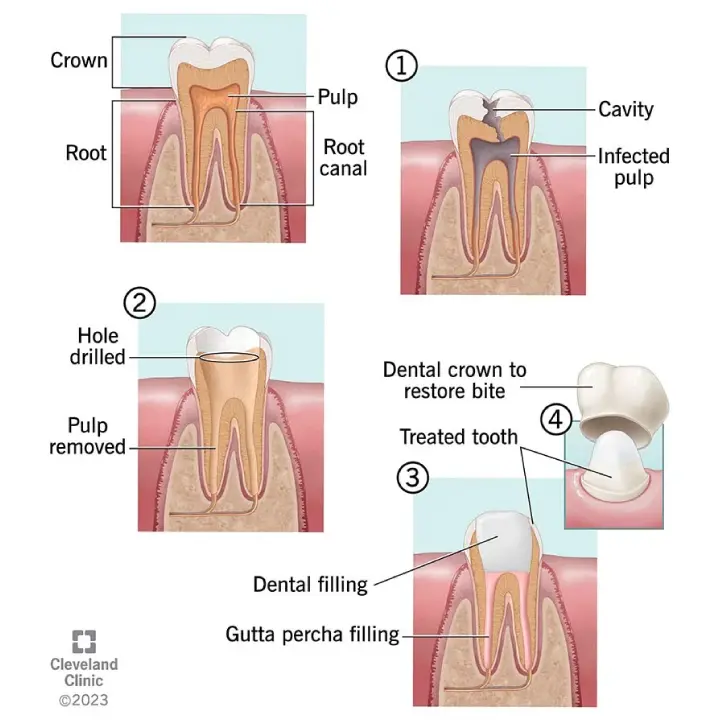
Root canal treatment available near you
When do I need root canal treatment?
You may need a root canal if bacteria inside your mouth invade the pulp inside your tooth and cause inflammation (pulpitis). Your tooth pulp may come under bacterial attack if:
- You have a deep cavity that needs treatment.
- You have a cracked or damaged tooth, and bacteria from plaque infects your tooth pulp.
What happens during a root canal procedure?
You may have questions about getting a root canal, and that’s OK—we’re here to help. With modern dental technology and anesthetics, a root canal procedure feels no different than having your tooth filled.
How does a root canal treatment work?
Here’s what you can expect during your root canal treatment:
Root canal frequently asked questions
Do root canals hurt?
Good news. Modern technology ensures that root canals are performed quicker and more precisely than ever, so your root canal is no more painful than getting a filling. Your Radix Dentistry care team is here to always keep you comfortable. Pain medication is distributed if needed to ensure ease during treatment.
What is a root canal?
A root canal is a common procedure designed to save your natural tooth. Your Radix Dentistry dentist will skillfully remove the damaged dental pulp from inside the tooth, carefully clean the affected area, and then will seal the tooth to safeguard against any future damage. Root canal therapy involves one or more visits.
What is the cost of a root canal?
The cost of a root canal can vary depending on factors such as the location of the tooth, the complexity of the procedure, and your dental insurance coverage. Your dentist can provide a cost estimate before the procedure.
Radix Dentistry root canals average around $1,192. But root canal cost range from an average of $1,104 for an anterior root canal, to an average of $1,380 for a molar root canal. As always, we’ll work with you to find an affordable care option to help you get your smile back. This includes insurance and financing options to fit your budget, with 4 out of 5 applications approved through third-party lenders.
What factors impact root canal cost?
Factors that impact the cost can be affected by:
- Location – Whether you need an anterior root canal, (located near the front of your mouth) a bicuspid root canal (in the middle of your mouth) or a molar root canal (near the back of your mouth) will directly influence the cost of your treatment
- Tooth condition – If a root canal was previously performed on the affected tooth, or if the infection requires surgery, your treatment costs could be impacted
- Dentist vs. specialist – The cost of a root canal varies based on who performs the treatment. Although working with an Radix Dentistry specialist will likely have a higher cost associated, it’s likely to also pose a better opportunity for insurance reimbursement
The final cost of your root canal treatment plan may also be affected by additional costs, such as:
- Related visits
- imaging or X-rays
How long does it take to recover from a root canal?
Following root canal therapy, most people return to normal function within a day or so. Over-the-counter medications can be used to treat any discomfort while you heal. Contact your dentist if you experience pain that lasts more than a few days, notice swelling, or feel like your bite is uneven.
Is a root canal a permanent solution?
A few factors play a role in how long your root canal treatment will remain effective. Some eating habits, like chewing on hard ice or carrots, can impact the lifespan of your root canal. However, the health of your tooth at the time of restoration is the main indicator of how long your root canal treatment will last. The more extensive the damage, the shorter the treatment’s lifespan—so contacting your Radix Dentistry office at the first sign of pain is important. Root canal therapy can be a lifelong solution when coupled with good oral hygiene habits and regular dental checkups.
How do I know if I need a root canal?
Root canal therapy is effective if you have an infected tooth that needs extra care. A tooth can become infected if it is cracked or chipped, if there’s deep tooth decay, or if multiple dental procedures have been done. A few warning signs of an infection are if you’re experiencing tooth discomfort, tooth discoloration, gum swelling, or sensitivity to hot or cold. Your Radix Dentistry dentist will perform a full exam on the tooth to determine the cause of your symptoms. If there’s infected or inflamed dental pulp, they will likely talk to you about prompt root canal treatment to save the tooth from extraction.
How long does a root canal take?
A root canal typically takes 1 to 2 hours to complete, depending on the location and complexity of the affected tooth.
Can I eat and drink normally after a root canal?
Yes, for the most part. While your tooth is healing, Radix Dentistry dentists recommend sticking to foods that are easy to chew and avoiding hard or crunchy foods. After a few days, you should be able to eat and drink like normal.
What are the risks of a root canal?
Thankfully, the risks associated with a root canal are generally low. Although uncommon, possible complications include infection, inflammation, or damage to surrounding teeth or tissues. Your Radix Dentistry care team will be ready to provide any additional support needed to help restore your healthy smile.
How can I prevent the need for a root canal?
Practicing good oral hygiene, like brushing your teeth twice daily and flossing at least once daily, can lower your chance of needing a root canal. It’s also best to visit your local Radix Dentistry dentist for routine checkups and cleanings. If a cavity is found during your checkup, performing the recommended treatment right away is essential to keep your teeth healthy and strong. But even the best-cared-for teeth run into problems now or then. So, if you need a root canal, your Radix Dentistry care team will be with you at every step—and help you feel relief.
Can a root canal be performed on a baby tooth?
Although less common, root canal therapy can be performed on a baby tooth to preserve it. For children developing permanent teeth, your local Radix Dentistry team can help find a pediatric dentist to create a care plan best suited for your family’s unique situation. Our team will create a unique care plan for adults with baby teeth that haven’t been removed. You can talk to a local care team member at Radix Dentistry to learn more.
Is a root canal treatment an emergency?
Before beginning treatment, your dentist or endodontist will take dental x-rays of the affected tooth. They may do other tests to determine if your tooth pulp is dead, infected or inflamed and confirm that you’ll need a root canal. They may:
- Gently tap on your tooth or touch it with a cold or hot substance to check for sensitivity or discomfort.
- Do an electric pulp test (EPT) by using a device that sends a gradually increasing electric current through your tooth to see if your tooth pulp reacts.
- Check for signs of swelling in the gums and bone around your tooth.
- Ask if it hurts when you bite down on your tooth.
During root canal treatment, your dentist or endodontist removes the inflamed pulp. Then they clean and disinfect the inside of your tooth and place a filling on your tooth to seal the space.
Root canal treatment steps are:
- Your provider injects anesthesia to numb your infected tooth and nearby gum. If you have dental anxiety, your provider may give you medications to help you relax. The medication may make you feel drowsy, which means you won’t be able to drive right after your treatment.
- Next, your provider places a thin, flexible piece of rubber over your infected tooth and nearby gums. This is a dental dam that keeps your tooth dry during treatment.
- They drill a tiny hole in your tooth’s crown so they can get to your tooth pulp.
- Then, they use tiny dental instruments to remove nerves, blood vessels and tissues inside your tooth pulp.
- After clearing out pulp, your provider cleans and disinfects your pulp chamber and root canals.
- Next, they fill the empty pulp chamber and root canals with a flexible, rubbery dental material called gutta-percha.
- Your provider then seals your tooth with a temporary dental filling. The seal keeps bacteria from getting into your tooth.
- In the last step, your provider places a dental crown on your treated tooth. Dental crowns protect your teeth and restore your bite — the way your teeth fit together when you bite down. Dental crowns are typically made to order, so it may be two or three weeks before this last step happens.
What happens after a root canal?
Your provider may suggest you rest for a few minutes before leaving the dental clinic or provider’s office. It can take an hour or more for anesthesia to wear off, meaning your mouth and gums aren’t numb anymore. Some people decide to rest at home while that happens while others choose to go on with their usual daily routine.
Typically, you’ll have two more appointments so a provider can prepare your tooth for a dental crown and then place the crown on your tooth.
What are the potential benefits of root canals?
Root canals eliminate tooth infections that, left untreated, could cause serious issues like:
- Infection that spreads to other teeth.
- Jawbone damage.
How do I take care of myself after a root canal?
Your tooth and gums go through a lot during a root canal. You can help them heal by:
- Eating soft foods for the first few days after treatment. (Think well-cooked pasta, mashed potatoes, cottage cheese, smoothies and yogurt).
- Avoid chewing on your treated tooth if you’re waiting on your permanent crown.
- If you smoke, try to take a break after your root canal because smoking makes it harder for your tooth to heal.
- Brushing your teeth after every meal and flossing once a day.
- Using an antibacterial mouthwash to keep germs at bay.
How can I avoid a root canal?
Putting off root canal treatment increases the chance that:
- You’ll lose your infected tooth.
- The infection in your tooth pulp will spread to other teeth.
- The infection will spread to your jawbone.
How can I avoid a root canal?
Practicing good oral hygiene and having regular dental checkups are the best ways to avoid root canal treatment. Brushing and flossing your teeth gets rid of dental plaque — a sticky film of bacteria that can cause cavities. Regular dental checkups mean your dentist can spot cavities and other issues early on before they affect your tooth pulp.
What happens if I delay root canal treatment?
Putting off root canal treatment increases the chance that:
- You’ll lose your infected tooth.
- The infection in your tooth pulp will spread to other teeth.
- The infection will spread to your jawbone.
Medical references and resources
Root Canal Treatment – American Association of Endodontists – https://www.aae.org/patients/root-canal-treatment
Root Canal: Procedure, What It Treats & Recovery – https://my.clevelandclinic.org/health/treatments/21759-root-canal
Slide show: Root canal treatment – Mayo Clinic – https://www.mayoclinic.org/diseases-conditions/tooth-abscess/multimedia/root-canal/sls-20076717
Root canal treatment: Everything you need to know – https://www.medicalnewstoday.com/articles/142780
Root Canal: Purpose, Procedure, and Risks – https://www.healthline.com/health/root-canal
Root canal treatment – Wikipedia – https://en.wikipedia.org/wiki/Root_canal_treatment
Root Canals | MouthHealthy – Oral Health Information from the ADA – https://www.mouthhealthy.org/all-topics-a-z/root-canals
What is a Root Canal and How Does it Work? – https://www.aspendental.com/dental-services/root-canal/
Medically reviewed by
#AUTHOR
#DATE
#COPYRIGHT
Caring for you throughout your root canal
Still have questions about what to expect before, during and after your procedure? We’re here to help—and walk you through it every step of the way.
Our Doctors’ Affiliations




Our Leander Location
10960 E Crystal Falls Pkwy Building 1, Suite 150
Leander, TX 78641




